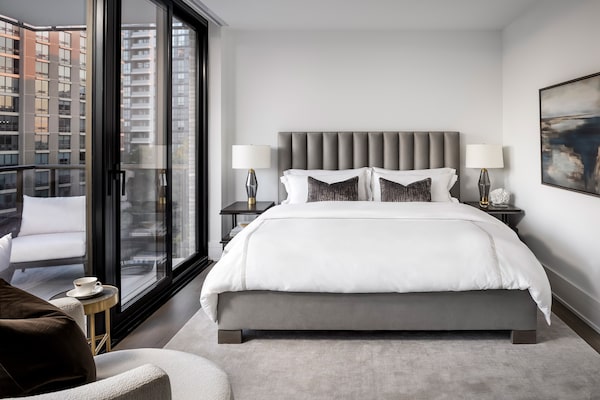
A restful sleep is much more attainable when soundproofing measures such as triple-glazed windows, floor underlays, acoustical ceilings and insulated pipes keep the noise down from outside or from your condo neighbours.Gillian Jackson/DBS DEVELOPMENTS
Those who have never lived in a condo environment cannot truly appreciate the luxury of a soundproofed unit until they’ve experienced living next to a noisy neighbour.
At one downtown Toronto condo building there has an ongoing situation in which a resident on the ground level has had more than 50 noise complaints from neighbours through this past January. One neighbour finally gave up and sold his suite. The condo board has been working to impose a force of sale on the noisy neighbour.
It’s such situations as these that have made soundproofing a suite a must for condo buyers, according to luxury real estate brokers.
“I think every purchaser I have dealt with in the luxury end of the market has asked about this,” says Janice Fox, broker of record at Hazelton Real Estate Inc.
“While all buildings meet the minimum standards as required by code, our buyers are looking for reassurance that the buildings in which they purchase exceed minimums. This could mean a sound blanket. It could mean an air pocket between the demising walls [interior partition walls dividing spaces] of the residence next door. It could mean a more complex system for floor installations to provide more sound insulation. It could mean a more efficient window system.”
The team at Toronto-based luxury real estate developer North Drive Investments says soundproofing is a focus at One Roxborough West, a 12-storey, mixed-use boutique condominium project in Toronto’s Summerhill neighbourhood. Evidence of the builder taking soundproofing seriously includes special acoustic glass on the façade, sound-absorbing ceiling and wall assemblies, and insulating plumbing pipes.
“What’s more, typical floors have only two or three suites, and front doors are all acoustically treated, so you simply won’t hear neighbours coming and going,” says Paul Johnston, who’s heading up sales efforts for the project. “So, people will be living in a small building, where comfort has been taken very seriously. Addressing sound transmission between suites is a paramount concern, so that owners can enjoy their homes peacefully.”
Similar soundproofing measures have been taken at 2Fifteen, a new, luxury purpose-built rental property in the Forest Hill neighbourhood of Toronto, says Bryan Levy, chief executive officer of DBS Developments, the company behind the project. The New York-style 2Fifteen is currently 75 per cent rented and a spring push that will sell out the building is expected. The building features 177 suites ranging from 583 square feet to 2,151 square feet that are refined and spacious, and offer high-end European appliances, luxurious finishes and spa-like bathrooms that residents can personalize.
“We invested in acoustical ceilings in bedrooms or living rooms, for our suites,” Levy says. “Knowing that we were going to own and manage the building for the long term, we didn’t want any sound issues.
“Most of the demising walls between the suites are structural shear walls, which provide additional soundproofing compared to a drywall built-up demising wall,” he says, adding that such details are important to plan up front because they’re more difficult to resolve after a build. “It’s very frustrating when you have noisy neighbours. It could diminish your quality of life very easily. And we wouldn’t want an issue with that for the long term.”
Another effective feature includes high-quality underlay beneath hardwood or tile flooring that ensures little or no sound transfer, Fox says. “For the ultra-wealthy, who purchase whole or half-floor units in luxury boutique buildings, this ensures even greater privacy.”
In discussions with her clients, she will review a prospective building’s specs and requirements. In older buildings, for instance, a planned renovation can provide an opportunity to add more sound insulation. And, with home speaker systems prevalent in a lot of high-rises, issues of vibrations or low-level sound can be addressed with the right insulation.
Soundproofing technology has increasingly become a fundamental expectation with buyers, says Cailey Heaps, a broker with Heaps Estrin/Royal LePage in Toronto.
“As lifestyles become more diverse and condos become multifunctional spaces for living, working and entertainment, a tranquil and quiet environment is increasingly emphasized,” she says.
“Developers of high-end condos in Toronto are responding to this trend by incorporating state-of-the-art soundproofing materials and technologies in their designs. It’s becoming an important selling point, especially in densely populated areas where external noise can be a concern.
“In fact, soundproofing is often discussed as part of the luxury amenities, alongside features like high-end finishes, smart home technologies and private balconies.”
Advertising feature produced by Globe Content Studio. The Globe’s editorial department was not involved.